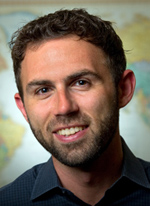The U.S. Supreme Court rulings on same sex marriage "suggest a sea change in our culture for gays and lesbians," said a UC Santa Cruz social psychologist who studies issues of sexual identity.
"I think we are clearly moving toward a radical new context for gays and lesbians -- the stigma is lifting (more quickly than I might have imagined 10 years ago), " said Phillip L. Hammack, UCSC associate professor of psychology and co-editor of the Oxford Series on Sexuality, Identity & Society. Hammack responded by email from Puerto Rico where he is attending meetings of the William T. Grant Foundation.
The foundation recently awarded Hammack a five-year $350,000 research grant. He is examining how lesbian, gay, bisexual, and transgender youth respond to stress and stigma in their communities and how community-based organizations might work with them to create more positive climates.
"As a social psychologist, I think about issues like the effects of stigma or support for harassment and violence, as well as the effects of unequal treatment (social injustice) on how gays and lesbians view themselves and their relationships," Hammack said.
He said his initial reaction on hearing news of the rulings was "that this is really an incredibly historic day for sexual minorities in the U.S. We've clearly reached a turning point in society with the recent swing toward a majority of Americans supporting same-sex marriage and now these two Supreme Court decisions which, while not as sweeping as they might have been, still represent clear civil rights victories for millions of gay and lesbian Americans.
"All of this means a better and kinder life course for gays and lesbians, with fewer health and mental health problems and fewer stressors from discrimination," Hammack said. "Their relationships are increasingly being recognized as legitimate and worthy of recognition, and their struggle is being seen more and more through the lens of basic civil rights."
However, he also cautioned that life for sexual minorities may still be difficult depending on where they live. While 13 states recognize same sex marriage now that California's ban is lifted, 37 others do not.
"There is a lot of variation in how communities treat gay and lesbian people and how they view non-heterosexual orientation," Hammack said. "So, while I think the trajectory is promising for the psychological well being of gays and lesbians, we need to start looking more at local communities, to really get the microscope in on how gays and lesbians in different types of communities across the nation are faring."
Court's same sex marriage ruling called a sea change for gays, lesbians
'We've clearly reached a turning point in society'



